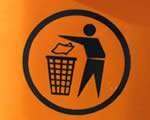 Go to main content
Go to main content
Archive Website of the UK government
Please note that this website has a UK government accesskeys system.
Main menu
Page menu
Environment and greener living

Hazardous waste disposal

Many things that are thrown out in the rubbish can contain harmful chemicals that damage the environment. Things like some household batteries, car oil, or old paint all need to be disposed of safely. Find out how and where to dispose of domestic hazardous waste.
What is hazardous waste?
Waste is hazardous when it has properties that might make it harmful to human health or the environment. The term 'hazardous' does not always mean that such waste is immediately harmful, though some can be.
What types of waste are hazardous?
Domestic wastes that may be hazardous include:
- asbestos
- pesticides
- fluorescent tubes
- oils
- some paints
- some household and car batteries
- discarded electrical equipment like TVs and computer monitors, fridges and freezers
- discarded energy saving light bulbs (also known as CFLs)
You can ask your council if you're not sure whether waste is hazardous or not.
How to dispose of hazardous waste
Waste and recycling centre opening times

Find locations and opening times of recycling centres near you
Hazardous waste – including electrical items like TVs, computers and fridges – shouldn't be put into the normal rubbish collection.
Instead, contact your council, who will be able to advise you on where to take all types of hazardous waste in your area. The link 'Find out about hazardous waste collection' takes you to your local council's website, where you can find out more.
Most hazardous waste can be taken to your local waste and recycling centre. This is sometimes referred to as the 'tip' or the 'dump', and is run by your local council.
In some cases, your local council may be able to collect the waste from you – there may be a charge for this. If you know that your council collects hazardous waste, you can use the link 'Request collection of hazardous waste'.
For bulky items like fridges, use the link 'Disposal of bulky items'.
Batteries
From February 2010, all shops that sell large amounts of household batteries must provide a collection bin for used batteries. You may also be able to put old batteries in your regular household recycling bins - check to see if your local council accepts them. You can also take batteries to a waste and recycling centre.
Car batteries should also be taken to a waste and recycling centre. Some shops that sell car batteries also accept old batteries for recycling. Check when you buy a new car battery to see if the shop will recycle your old battery for you.
Energy saving light bulbs
Energy saving lightbulbs (CFLs) can be hazardous if not disposed of properly, as they contain mercury. 'Energy saving light bulbs' explains how to recycle them safely.
Unused drugs and medicines
If medicines are flushed down the toilet, traces of them can end up in water courses like rivers or the sea.
You can take any out-of-date or unwanted medicines to your local pharmacy, who will dispose of them safely. You can also donate certain, in-date medicines to Inter Care, a charity that uses them in developing countries. The link below shows you medicines that Inter Care accepts.
Inter Care prefers to receive medicines through GPs who are registered to donate with them, so check with your GP first. If they aren’t registered, you can encourage them to do so, or post accepted medicines directly to Inter Care. For details on both of these options, see ‘How to donate medicines to Inter Care’.
Asbestos
Asbestos can become dangerous if it's broken. You should contact your local council for special advice on how to deal with asbestos. More information on dealing with asbestos can be found in the 'Asbestos removal' article in the Home and Community section.
Illegal dumping of hazardous waste
If you spot hazardous waste being dumped illegally, you should contact your local authority or the Environment Agency. Find out how to do this in 'Reporting polluted land and water'.
 Facebook
Facebook Twitter
Twitter StumbleUpon
StumbleUpon Delicious
Delicious Reddit
Reddit
